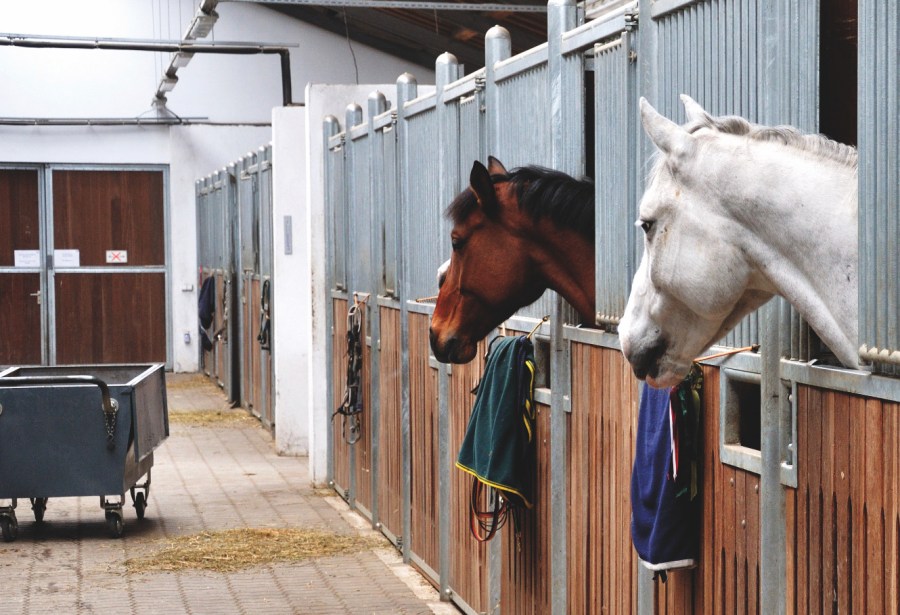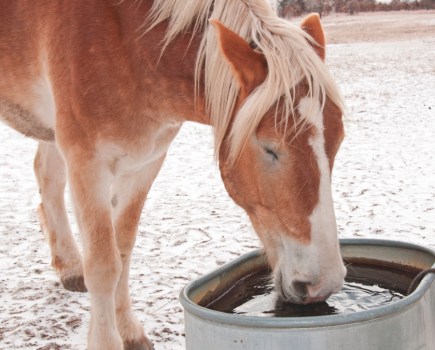Modern life and approaches to stable management has unintentionally imposed lifestyles on horses that they aren’t well equipped to deal with. When you consider they are designed for continuous movement, a varied environment, an active social life, and relish the challenge of finding food, it is not difficult to see how we can get it wrong. This has in part led to an equine obesity epidemic, and it is essential that horse owners and riders everywhere do all they can in order to make their charges #FitNotFat — and help them to be as healthy as possible.
Modern methods of keeping horses invariably involve stabling, relatively small turnout areas, lack of social interaction, short, infrequent exercise, little foraging for food and the feeding of high-intensity concentrates. We are essentially confining them to small, boring spaces, with little opportunity for adventure and throwing them a bag of sweets twice a day.
Of course, many of us try to mimic what nature intended for our horses as best we can with the facilities we have, but there’s always more we can do, and it is surprising how much room for improvement there is if we get our critical heads on.
Do leisure horses have it best?
It’s wonderful to see professionals speaking out about the benefits of hacking and jumping dressage horses, or turning out and swimming racehorses. To be a top athlete you need to be healthy both mentally and physically, so the importance of lifestyle as a whole is starting to be recognised and appreciated by all.
It would be easy to assume most leisure horses have it the best, as they are frequently turned out for long periods and undergo more varied forms of exercise, but is this assumption correct?
Our busy lifestyles mean that many leisure horses are only exercised a few times a week, if that, and sometimes at very low intensity and for short periods. Couple this with uninspiring turnout and lack of companionship and some leisure horses can easily lead a very sedentary life. Inadequate exercise and lack of mental stimulation may be having more of a detrimental effect than we realise.
Why is a sedentary lifestyle such a serious problem?
Unfortunately, leisure horses are most likely to be overweight (up to 70% of them according to recent studies), due to lack of exercise and/or excessive calorie intake. As with humans, extra weight can creep on slowly and it can be difficult to spot until it’s too late, which is why it’s always easier to prevent than treat. Losing weight is hard work, particularly the more of it there is and the longer it has been there, but ignoring it can be fatal.
One of the most serious consequences of storing too much fat and overwhelming the metabolic system — frequently resulting in a condition called equine metabolic syndrome (EMS) — is interference with the horse’s insulin system, causing ‘insulin dysregulation’. When this occurs, the horse is at high risk of developing laminitis, which can happen without warning, even in horses who have been overweight for a long time and seemingly never suffered laminitis before.
If the laminitis is mild, caught early and the weight problem is addressed promptly, the horse may recover. However, in some cases, the laminitis is subtle and not detected early enough or it may even happen so quickly and severely that the laminae are too badly damaged for the horse to recover. In these cases, the pain can be unmanageable and the chance of recovery so small that euthanasia becomes the kindest option.
So, while a lack of exercise and a bit of ‘extra weight’ may not sound too sinister, they can be the cause of death in some horses, so should never be underestimated.
What can owners do to help?
Everyone’s situation is different, and we can’t all provide the perfect life for our horse, but we can do our best by assessing each aspect of their management and then try to improve it. In summary, a sedentary lifestyle doesn’t benefit your horse any more than it benefits us. In fact, you could argue that a horse’s physical and mental stimulation needs are even more important because the means by which they can help themselves is so limited in captivity. They are at our mercy, so we owe it to them to do all we can to make their lives as healthy and happy as possible.
![]() Have you heard about Your Horse’s #FitNotFat campaign, which is supported by Dodson & Horrell? Equine obesity is an enormous welfare problem and we’re on a mission to provide owners and riders with the knowledge, skills and information you need to keep your horse in tip-top health. It could be life saving! Find out more
Have you heard about Your Horse’s #FitNotFat campaign, which is supported by Dodson & Horrell? Equine obesity is an enormous welfare problem and we’re on a mission to provide owners and riders with the knowledge, skills and information you need to keep your horse in tip-top health. It could be life saving! Find out more









